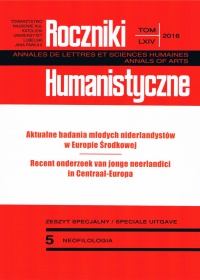Structural future, predictions, posteriorty and emergent grammar: A contribution to the discussion on panchrony
Abstract
In this article, I investigate two theoretical concepts pertaining to the nature of grammatical structures. Firstly, I discuss the notion of panchrony as a non-reductionist alternative to the structuralist dichotomy of diachrony versus synchrony. Secondly, I shortly introduce the emergentist approach to language that rejects the idea of language as a static, stable system. Afterwards, I am going to show how a panchronic view of language benefits the emergentist approach. Namely, I am going to stress the importance of the structural posteriority which is often neglected in traditional grammar models and only implied in emergentist ones. The emergent nature of language, as I am going to argue, can only be described if the speakers’ structural predictions are taken into account as well. Apart from combining the structural anteriority, i.e. diachrony, and structural contemporaneity, i.e. synchrony, structural posteriority has to be taken into account as well. In that case, every speaker in every utterance builds upon their earlier linguistic experience and thereby—to some degree—forms their future utterances
References
Chomsky, Noam. 1965. Aspects of the Theory of Syntax. Cambridge, MA: MIT Press.
Christie, William M., Jr. 1982. ‘Synchronic, diachronic, and panchronic linguistics.’ In J. Peter Maher, Allan R. Bonhard & E.F. Konrad Koerner (eds.). Papers from the 3rd International Conference on Historical Linguistics, 1–10. Amsterdam: John Benjamins,.
Coseriu, Eugenio. 1974. Synchronie, Diachronie und Geschichte. Das Problem des Sprachwandels. Übersetzt von Helga Sohre. München: Wilhelm Fink.
Diessel, Holger. 2007. ‘Frequency effects in language acquisition, language use, and diachronic change.’ New Ideas in Psychology, 25: 108–127.
Givón, Talmy. 1999. ‘Generativity and Variation. The Notion ‘Rule of Grammar’ Revisited.’ In Brian MacWhinney (ed.). The Emergence of Language, 81–114. Mahwah, NJ: Lawrence Erlbaum Associates.
Harris, Roy. 1991. ‘On redefining linguistics.’ In Hayley G. Davis & Talbot J. Taylor (eds.). Redefining linguistics, 17–68. London: Routledge.
Heine, Bernd, Ulike Claudi & Friederike Hünnemeyer. 1991. Grammaticalization. A conceptual framework. Chicago, IL: University of Chicago Press.
Heine, Bernd & Tania Kuteva. 2004. World Lexicon of Grammaticalization. Cambridge: Cambridge University Press.
Himmelmann, Nikolaus P. 1992. Grammaticalization and Grammar. Köln: Universität zu Köln.
Himmelmann, Nikolaus P. 1997. Deiktikon, Artikel, Nominalphrase. Zur Emergenz syntaktischer Struktur. Tübingen: Max Niemayer.
Himmelmann, Nikolaus P. 2004. ‘Lexicalization and grammaticalization: Opposite or orthogonal?’ In Walter Bisang, Nikolaus P. Himmelmann & Björn Wiemer (eds.). What makes grammaticalization? A look from its fringes and its components, 21–42. Berlin: Mouton de Gruyter.
Himmelmann, Nikolaus P. 2005. ‘Gram, construction, and class formation.’ In Clemens Knobloch & Burkhard Schaeder (eds.). Wortarten und Grammatikalisierung. Perspektiven in System und Erwerb, 79–93. Berlin: Walter de Gruyter.
Hjelmslev, Louis. 1928. Principes de grammaire générale. København: Bianco Lunos.
Hopper, Paul J. 1987. ‘Emergent grammar.’ In Joe Aske, Natasha Beery, Laura Michaelis & Hana Filip (eds.). Berkeley Linguistics Society. Proceedings of the Thirteenth Annual Meeting, February 14–16, 1987: General Session and Parasession on Grammar and Cognition, 139–157. Berkeley, CA: Berkeley Linguistics Society.
Hopper, Paul. J. 1988. ‘Emergent Grammar and the A Priori Grammar Postulate.’ In Deborah Tannen (ed.). Linguistics in context: Connecting observation and understanding, 117–134. Norwood, NJ: Ablex.
Jakobson, Roman. 1962. ‘Freitag, 2. 10. 1959. Vormittagssitzung.’ In Georg Friedrich Meier (ed.). Zeichen und System der Sprache. II. Band. Veröffentlichung des 1. Internationalen Symposions „Zeichen und System der Sprache“ vom 28. 9. bis 2. 10. 1959 in Erfurt, 50–56. Berlin: Akademie Verlag.
Kamide, Yuki. 2008. ‘Anticipatory Processes in Sentence Processing.’ Linguistics and Language Compass, 2, 4, 647–670.
Keller, Rudi. 1990. Sprachwandel. Von der unsichtbaren Hand in der Sprache. Tübingen: Francke.
Kiparsky, Paul. 1968. ‘Linguistic universals and linguistic change.’ In Emmon Bach & Robert T. Harms (eds.). Universals in linguistic theory, 171–210. New York, NY: Holt, Reihart and Wilson
Kuteva, Tania. 2001. Auxiliation. An inquiry into the nature of grammaticalization. Oxford: Oxford University Press.
Lehmann, Christian. 1985. ‘Grammaticalization: synchronic variation and diachronic change.’ Lingua e Stile 20: 303–318.
Luhmann, Niklas. 1984. Soziale Systeme. Frankfurt am Main: Suhrkamp.
Paul, Herman. 1920. Prinzipien der Sprachwissenschaft. 5de uitgave. Halle an der Saale: Max Niemeyer.
Saussure, Ferdinand de. 1916. Cours de linguistique générale. Publié par Charles Bally & Albert Sechehaye. Avec la collaboration de Albert Riedlinger. Lausanne: Payot.
Schuchardt, Hugo. 1917. ‘Rezension von „Ferdinand de Saussure: Cours de linguistique générale“.’ Literaturblatt für Germanische und Romanische Philologie 38, 1/2: 1–9.
Sperber, Hans. 1960. ‘Linguistics in a strait-jacket.’ Modern Language Notes 75, 3, 239–252.
Stolz, Thomas. 1991. ‘Panchronie: (nicht nur) ein terminologisches Problem.’ In Benedikt Boretzky, Werner Enninger, Benedikt Jeßing & Thomas Stolz (eds.). Sprachwandel und seine Prinzipien. Beiträge zum 8. Bochum-Essener Kolloquium über „Sprachwandel und seine Prinzipien“ vom 19.10. – 21.10. 1990 an der Ruhruniversität Bochum, 51–70. Bochum: Brockmeyer.
Zeige, Lars Erik. 2011. Sprachwandel und soziale Systeme. Hildesheim: Olms.
Copyright (c) 2016 Roczniki Humanistyczne

This work is licensed under a Creative Commons Attribution-NonCommercial-NoDerivatives 4.0 International License.





